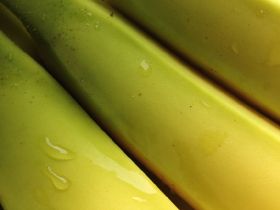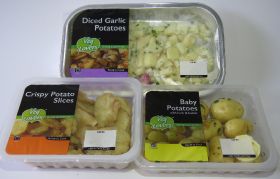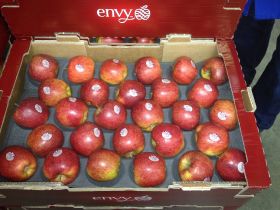Veg News
The EU’s average fruit and veggie intake has gone up to 364.58 g/day/capita in 2021. It’s a 2.19% increase from last year, and 1.27% higher than the previous 5-year average. However, it’s still almost 10% less than the 400g/day/capita minimum recommended by the World Health Organization.
The fresh produce market size in the EU-27 reached £74.35m tonnes in 2021. This growth aligns with the positive trend seen since 2020, thanks to the Covid-19 pandemic.
But, the economic crisis following the war in Ukraine in 2022 has put fruit and veggie consumption in Europe under pressure. Consumer purchasing power has been affected, and food expenditure has been limited.
During crises, consumers tend to move towards less healthy diets. They see them as more energy-satisfactory and cheaper than fruits and veggies. This is why Freshfel Europe believes that the post-pandemic consumption growth has been lost. Consumption has declined by over 10% in many cases.
According to the Freshfel Europe Consumption Monitor, only a few EU countries reached the recommended goal of consuming at least 400g of fresh fruits and vegetables every day.
Freshfel Europe is concerned that a 2019 Eurostat survey shows that 33% of EU consumers consume no fruit or veggies every day. Another 55% do not reach the recommended five portions a day. The association is also worried about the low consumption rates seen amongst the younger generations and in lower-income households.
Freshfel Europe thinks that more needs to be done to encourage consumption. They believe that the fruit and vegetable sector should build on the momentum of increased consumption. This should be based on the benefits of fresh fruit and vegetables for the planet, the climate, and the consumers’ health.
Freshfel Europe also wants to counter the misperception that fruits and vegetables are expensive. They believe that the sector should demonstrate its affordability and nutritional value. This would help move consumers towards a plant-based diet.
Adding one piece of fruit or vegetable to the daily diet of European consumers could help boost consumption. This could bring the European market size up by almost 20% or 15m tonnes.
Freshfel Europe concludes that a healthy diet that meets the minimum recommendation remains affordable. It can be achieved for less than £2/day.
Information derived from fruitnet.com.
As individuals age and gain more experience in their careers, they often face unique challenges when it comes to job searching. Age bias is a common issue that matures workers encounter, with employers sometimes being hesitant to hire them due to concerns about potential health issues, outdated skills, or lack of flexibility. However, it is possible for mature workers to overcome these challenges and find success in their job search. In this blog, we will explore some strategies for overcoming age bias and finding a job as a mature worker.
Emphasize your experience
One of the greatest assets that mature workers have is their wealth of experience. When applying for jobs, make sure to highlight your past accomplishments and emphasize how your previous work experience can benefit the new employer. Showcase your experience in specific industries and roles and highlight your successes in those positions. This will help potential employers see the value that you can bring to their organization.
Stay current
While experience is important, it’s also important to stay current in your field. Take classes, attend conferences, and participate in professional organizations to keep your skills up to date. Being knowledgeable about new technologies and trends in your industry will demonstrate your commitment to staying relevant and competitive in the job market.
Network
Networking is essential for job seekers of any age, but it can be especially valuable for mature workers. Reach out to former colleagues and industry contacts, attend industry events, and join professional associations. Building and maintaining a strong network can lead to job leads, referrals, and valuable insights into potential job openings.
Be flexible
Many mature workers have a wealth of experience, but they may also have fixed expectations about what they want in their next job. Be open to new experiences and opportunities and consider roles that may not be an exact match for your previous positions. Demonstrating your flexibility and willingness to learn can make you a more attractive candidate to potential employers.
Address age bias head-on
Unfortunately, age bias does exist in the job market, and it’s important to address it directly. Be prepared to answer questions about your age and experience and respond with confidence and enthusiasm. Emphasize your ability to learn and adapt to new situations and highlight your willingness to take on new challenges.
In conclusion, job searching as a mature worker can be challenging, but with the right strategies and mindset, it is possible to overcome age bias and find success. Emphasize your experience, stay current in your field, network, be flexible, and address age bias head-on. By doing so, you’ll be well on your way to finding a fulfilling new job that utilizes your skills and experience to the fullest.
French importer expands presence in Central and Eastern Europe with new facility close to Hungarian capital

French tropical fruit importer Compagnie Fruitière has opened a new Hungarian subsidiary to expand its presence in Central and Eastern Europe.
Compagnie Fruitière Hungary will now market all products in the region, previously distributed through local partners.
The company will now use its own ripening facility to develop its distribution network, located on near major roads and on an industrial estate close to Budapest.
It is equipped with the latest ripening technology, with 12 two-tier ripening rooms, each holding 24 pallets and with a ripening capacity of 20,000 boxes a week. The facility is IFS-certified (International Food Standard).
Retailer reports ‘strong’ Christmas trading although saw sales fall by 1.5% during the third quarter
Tesco saw like-for-like sales rise by 1.3% during the key six-week Christmas trading period thanks to low prices and a strong “seasonal offering”.

In contrast, like-for-like sales fell by 1.5% during the retailer’s Q3 (13 weeks to 28 November), which the retailer said was down to not repeating ‘£5 off £40’ national coupon campaigns from the previous year.
Chief executive Dave Lewis said more staff on shop floors boosted sales over Christmas, which also saw volumes rise by 3.5% and transactions increase by 3.4%. He hailed the Christmas results as a “significant improvement” on recent years.
“Our Christmas performance was strong, benefiting from lower prices on an outstanding range of products,” Lewis said. “Our customer service improved materially and our colleagues went the extra mile.
“Through our ongoing investment in lower, more stable prices, we were around five per cent cheaper than last year on the lines that mattered most to our customers at Christmas.”
Lewis said strong Christmas performance was evident across all formats and categories, including positive like-for-like sales growth in Tesco Extra.
International sales have continued to grow, he continued, including positive sales momentum in Europe and Asia, and the Thai business reaching its highest-ever market share.
“There is plenty more to do, but we are making good progress and are trading in line with profit expectations for the full year,” he added.
Retailer’s announcement relaunches price war into 2016 while CEO Andy Clarke says ‘radical and logical action’ is needed
Asda has invested £500 million in further price cuts in the first major move this year for price war between the top four retailers and discounters.
Chief executive Andy Clarke said the business must take “radical action” to win back customers and said he expects 2016 to be another year of intense pressure.
The investment into prices comes on top of the £1 billion over five years Asda said it would invest into price in November 2013. It is part of Project Renewal – a two-year programme within Asda’s five-year strategy to reinforce its value proposition.

The news comes as Asda also announced it has joined European buying alliance EMD, which will help develop the company’s own-label range. EMD is made up of 14 national buying structures and pools the collective buying power of 250 supermarket chains.
EMD membership will help develop a “radical shake-up” of its approach to buying, Asda said, and alongside leverage from IPL it will be able to “release significant savings from its supply chain”.
Clarke said: “Asda is unquestionably the UK’s lowest price full range supermarket business and we intend to strengthen that position. Indeed, we reaffirmed this as 2016 began when we became the first retailer to cut unleaded and diesel prices below £1.
“The structure of UK grocery retailing has permanently changed to reflect the way that customers shop today. Being part of Walmart also gives us insight into similar trends in the rest of the world and it’s clear that this is a global phenomenon.”
Clarke said Asda saw the change coming and responded in 2013 but “didn’t move fast enough”. “There is currently no growth in the food market and the rise of the limited assortment discounters means that we must take radical action to win back our customers. Today, from our strong financial position, we are taking another bold step forward in our five year strategy,” he said.
“Fundamentally changing how we buy products means we can realise significant savings from our cost base and pass these directly to customers through a rebased pricing model. Joining forces with the huge EMD network of 250 European supermarkets will give us significant economies of scale. We’ll continue to work with our suppliers to lower costs in our supply chain and return sales to growth in partnership.
“But we are not complacent. We remain cautious and, as the chancellor warned on Thursday, we expect that 2016 will be another year of intense pressure at a macro-economic level in addition to sales remaining under strain from price deflation, a continued competitive background throughout the sector and radically changing customer shopping habits.”
Alongside the price cuts, Asda will also invest in 95 of its largest stores to make them “more relevant”, removing “fringe ranges” and investing in own-label.
Clarke continued: “We know our customers better than anyone else and we need to structure our offer to meet their changing needs. This knowledge has shaped our plans to make our bigger stores easier to shop, laying them out in a way that’s relevant to today’s customers by removing fringe, marginal ranges, significantly investing in our own label ranges and providing services that they need.”
He warned that industry faces “more turbulence” in the short-term, but insisted that in the long-term he has the “right and winning strategy”.
“We expect that 2016 will be another year of intense pressure at a macroeconomic level, in addition to sales remaining under strain from price deflation, a continued competitive background throughout the sector, and radically changing customer shopping habits,” Clarke said.
The news comes as both Aldi and Lidl begun 2016 by reducing the price point of select promoted fresh produce items from 39p to 29p. Trading figures for the key Christmas period are due this week (w/c 11 January) for several of the major retailers, with Asda due to report in mid February.
Veg Lovers aims to tempt new consumers into trying fresh prepared lines by focusing on core, successful products
QV Foods has extended its Veg Lovers brand into prepared produce.

Sister brand to QV Foods’ Potato Lovers range, Veg Lovers aims to encourage and tempt new consumers into trying fresh prepared lines by focusing on “core, successful products” rather than “baffling them with an array of choices”.
The move to establish Veg Lovers comes after QV Foods was tasked by one of its customers to bring a new branded range of fresh prepared vegetables and potatoes to market in less than a month.
The packaging has been designed to try and simply convey the name of the product and its contents, whilst looking good on shelf.
Sales and marketing director Simon Martin: “Everyone at QV worked really closely to create this range. From the pack imagery to the cooking instructions, it’s been a real team effort.
“Since launching, the Veg Lovers’ prepared range has seen astonishing double digit week-on-week growth, meaning that consumers are indeed identifying with the brand and the products.
“QV Foods’ development team plan to ensure that a steady stream of innovative new lines are rolled out into the brand over the course of next year, whilst keeping to the philosophy of focusing on proven formats.”
Retailer will stock wonky carrots, potatoes, onions and parsnips in new range after Hugh Fearnley-Whittingstall highlights food waste

Morrisons is launching a new permanent range of wonky vegetables before the end of this year at a discounted price.
The new range will include wonky veg such as onions, potatoes, carrots and parsnips, Morrisons told FPJ. A spokesperson said the retailer already sells Class 2 carrots as part of its Savers range, but the new wonky range is a new addition.
The news comes following a programme by celebrity chef and food campaigner Hugh Fearnley-Whittingstall, named Hugh’s War on Waste, where he gave away outgrade parsnips outside a London branch of Morrisons to highlight the problem of food waste.
In response, the retailer conducted a trial of selling wonky courgettes alongside Class One courgettes, but found that the ‘ugly’ vegetables sold much more slowly which was anticipated. Morrisons said this was because it had been priced the same as the Class One produce, and wonky veg only works when it is discounted.
Fearnley-Whittingstall criticised the trial as “pathetic” and told the Guardian newspaper that placing Class One next to substandard produce is “not what we’re asking supermarkets to do”.
It’s not the first time a celebrity chef has been instrumental in prompting a supermarket to stock outgrade produce – earlier this year Jamie Oliver persuaded Asda to launch its first-ever range of wonky fruit and vegetables after meeting growers as part of his Channel 4 series Jamie and Jimmy’s Friday Night Feast.
Research by mySupermarket.co.uk in October also found that a basket of essentials rose slightly from £85.94 to £86.16 in that month
Morrisons has narrowly come out cheapest in a study of grocery essentials for the month of October.

The monthly study, conducted by mySupermarket.co.uk, the shopping and comparison website, monitors the cost of the same 35 most-commonly bought grocery products.
Overall, it found that a basket of essentials rose slightly from £85.94 in September to £86.16 in October.
The October increase was driven by a sharp rise in the cost of broccoli, up 18%, and mushrooms, up 11%. Only apples fell significantly in price, dropping 11% in price compared to September.
The small rise follows a period of falling grocery prices, with the September basket total of £85.94 having been the lowest in 2015.
mySupermarket analysed the basket cost across the top four supermarkets, Tesco, Asda, Sainsbury’s, and Morrisons, plus Waitrose and Ocado, and found significant differences in price.
Morrisons was the cheapest closely followed by Asda. Ocado was most expensive, with Waitrose coming second bottom.
In comparison to a year ago, though, the same basket in October 2014 would have cost shoppers £89.74, a saving of 4%.
Gilad Simhony, CEO of mySupermarket.co.uk, said: “One side effect of the current supermarket price war – the environment in which supermarkets are fighting for shoppers hard earned pounds – is that the cost of grocery staples are being priced very competitively.
“This is great news for shoppers who are looking to make savings. Another side effect, however, is more confusion regarding which of the supermarkets is cheapest as the price of our favourite grocery products can change on a daily basis. Shoppers need to be aware and take control of their weekly shop as the differences in price can be huge.”
Worldwide Fruit aims to double Envy exports
Apple marketer Worldwide Fruit has said it plans to more than double exports of New Zealand apple variety Envy to Asia this year after successfully sending 2.5 containers to Singapore last year.

Speaking at last week’s National Fruit Show, Technical Director Tony Harding told the Fresh Produce Journal that the company is taking a different approach this year, by giving growers specific standards for exporting Envy. The aesthetic qualities required by Asian markets, such as colour and skin finish, are different to European customers, he said.
Elsewhere, Harding said Jazz remains a primary focus for Worldwide Fruit and said the variety is performing “extremely well”.
“Jazz is performing extremely well, and it’s ahead of the market with returns and sales. It’s a nice crop from Europe and the UK. It looks very good and eating quality is very high,” he said.
On pears, the company has launched new early blush variety Qtee this year, which crops “very well” and arrives onto the market earlier than Conference. “It’s gone very well, we’ve sold small volumes of UK-grown fruit into Waitrose and some wholesalers. The season has just finished but we have high hopes for the future,” Harding said.
Speaking about the wider top-fruit market, Harding said the market has been “hard work” in recent weeks, although some varieties have bucked the trend.
“It has been particularly tough for red dessert apples and Cox, though other varieties are performing better. There is a strong appetite for Gala and Conference.
“We are trying to improve returns on last year, and so far so good. The value of the crop is reflected in the volumes that are out there.”